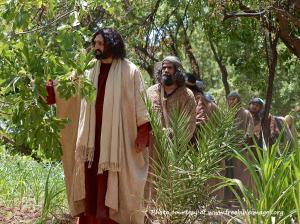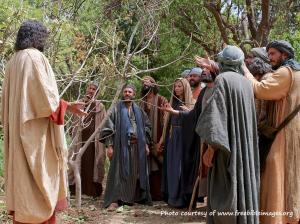By An Anonymous Writer/Member of Easter Lutheran Church
Ecclesiastes 3:7 “A time to tear and a time to mend. A time to be silent and a time to speak.”
Several months ago my husband and I woke up to discover we’d come down with foot-in-mouth disease. Big time. We inadvertently offended someone we love and respect. (Big time.) And wow she was angry. Big time. We’re talking “I’ll-never-speak-to-you-again” and “Don’t-you-dare-approach-or-I will-turn-my-back-on-you-and-walk-away!” Really big time!
 In Lent we heard so frequently of God’s love for us even when we ignore Him. He just keeps on giving. He loves and forgives us daily for our every sin. He even let His son be persecuted and killed just so our sins, our foot-in-mouth diseases, wouldn’t stand in the way of our salvation. I am unable to comprehend a love that is so strong you would sacrifice your son. That’s who He is–a giver who never stops giving; a Love that will always be there to welcome our approach. Big time!
In Lent we heard so frequently of God’s love for us even when we ignore Him. He just keeps on giving. He loves and forgives us daily for our every sin. He even let His son be persecuted and killed just so our sins, our foot-in-mouth diseases, wouldn’t stand in the way of our salvation. I am unable to comprehend a love that is so strong you would sacrifice your son. That’s who He is–a giver who never stops giving; a Love that will always be there to welcome our approach. Big time!
A common saying among our friends is, “Fool me once, shame on you; fool me twice, shame on me.” That’s not forgiveness. I Cor. 13:5 says Love keeps no record of wrongs. When we sin we’ll never hear God saying, “Okay, that’s twice!” And we must forgive others as quickly as we expect God to forgive us. That’s big time difficult! Forgiveness is me giving up my right to hurt someone who hurt me. This is what God does – all the time!
Lent this year meant weeks of watching Jesus be so very brave, loving and forgiving. Weeks to not mourn our hurt, instead to tell our hurt and pain that’s it’s time go away and simply love. It meant we really understood the great disappointments we cause our Father. Yet we must do as He did and forgive. Big time.
The writer of Ecclesiastes said there’s “a time for everything.” Lent showed us big time that our time is now.
Please join us in prayer that our ever forgiving Lord and His brave, unselfish Son will be with us in our times of missing the mark. We ask them to bless our words and deeds so that we may always be loving—big time!






